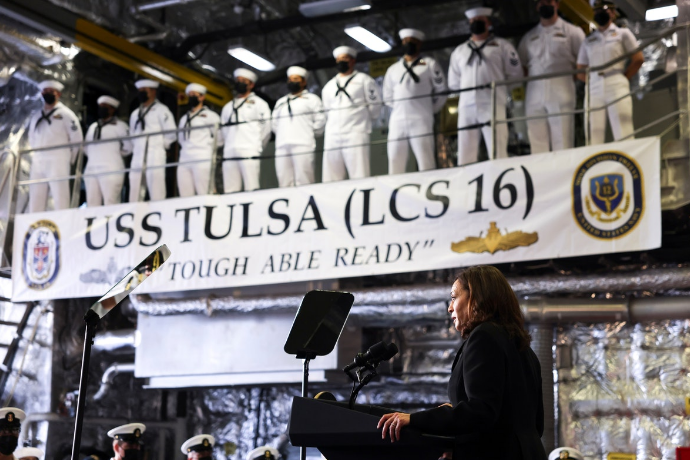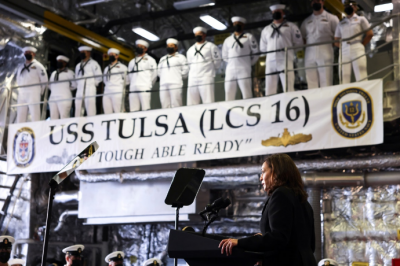U.S. Vice President Kamala Harris accused China of following a policy of "coercion and intimidation," asserting that it poses a threat to Asian countries. She assured them that the United States would not force them to choose between Washington and Beijing, according to Bloomberg. Harris delivered a speech in Singapore on Tuesday, discussing the U.S. vision for a rules-based region, human rights, and freedom of the seas and trade without barriers. She also proposed that the United States host a summit in 2023 for the Asia-Pacific Economic Cooperation (APEC) forum, which includes 21 countries.
Harris accused Beijing of engaging in "coercion and intimidation and claiming the vast majority of the South China Sea," adding, "As we face threats to this system, I am here to reaffirm our commitment to this vision... to enhance it and ensure it addresses today’s and tomorrow's challenges." She addressed a ruling issued by the International Court of Arbitration in The Hague regarding China's claims in the South China Sea, stating, "These illegal claims were rejected in a ruling by the arbitration tribunal in 2016, and China's actions continue to undermine the rules-based order and threaten the sovereignty of nations."
China rejected the ruling and has established military sites on artificial islands in the sea, while the U.S. Navy regularly conducts "freedom of navigation" operations in disputed waters, a move that angers Beijing. China claims sovereignty over the majority of the sea, rich in resources through which trade estimated at trillions of dollars annually passes, while Brunei, Malaysia, the Philippines, Taiwan, and Vietnam claim parts of it. Harris will visit Vietnam on Tuesday, the second and final stop on her Asian trip.
**Shared Interests Partnerships**
Harris inspected the U.S. warship "USS Tulsa" at Changi Naval Base in Singapore on Monday and told American sailors that "a significant part of 21st-century history will be written about this region," emphasizing the central role of their work in defending it, according to Reuters. Harris's remarks, which the White House described as a key speech in foreign policy, echoed issues raised by other administration officials who sought to engage more with U.S. allies, moving away from the "America First" principle adopted by former President Donald Trump. The U.S. administration described the competition with China as "the biggest geopolitical test" of this century, while a senior Chinese diplomat accused the United States of creating a "phantom enemy" to divert attention from its internal problems and undermine Beijing, according to Reuters.
The Vice President stated that American partnerships "will now be based on transparency, openness, inclusiveness, mutual interests, and reciprocal benefits," adding that "our engagement in Southeast Asia and the Indo-Pacific is not against any country and is not designed to compel anyone to choose between nations."
**Singapore's Balance**
Bloomberg noted that Singapore has tried to find a balance in its relations with Washington and Beijing, stressing that it would not prefer either side. Simon Sanders, spokesperson for the U.S. Vice President, told Bloomberg Television that Harris's comments on China were "part of a broader agenda," adding, "Honestly, if that's what we focus on, it does not reflect the true vision that the Vice President presented today."
Harris began her speech by discussing Afghanistan, defending President Joe Biden's decision to withdraw U.S. forces, describing it as "bold and right," and emphasizing that the United States "is laser-focused" on evacuating at-risk American and Afghan citizens.
**Supply Chains**
After her speech, Harris participated in a roundtable discussion on supply chains with government officials and executives from international companies, including BlackRock, United Parcel Service, Procter & Gamble, GlobalFoundries, and Temasek Holdings, a state-owned investment company in Singapore. This comes amid a global shortage of semiconductors and other critical goods that have disrupted supply chains and delayed production across many sectors. GlobalFoundries, a U.S.-based semiconductor company, announced plans to invest $4 billion in a new facility in Singapore, according to Bloomberg.
During the roundtable, Harris noted that the Delta variant of the COVID-19 virus forced manufacturers worldwide to adjust production and reassess their workforces. She added, "I have discussed this issue with many labor leaders in the United States, who care not only about workplace safety concerning the virus but also about layoffs resulting from reduced production lines."




